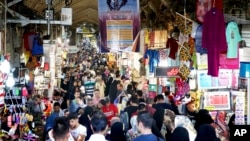Iran's currency hit new lows with just less than a week before new U.S. economic sanctions are due to take effect on August 4, despite the appointment of a new central bank governor and a new economic team.
Arab and Iranian media reported the Iranian rial hit a new low of 111,000 to the U.S. dollar on Sunday in unofficial trading, a bad omen for newly appointed Central Bank head Abdolnasser Hemmati.
Vice President Ishaq Jahangiri announced the new economic team Sunday as the newly appointed central bank chief took office.
The falling value of the rial has made imports more expensive and life more difficult for many Iranians.
In calls from Iran to the Monday edition of VOA Persian’s Straight Talk call-in show, one man who identified himself as Astiak in the central city of Arak said he suffers from heart disease and has seen his medication more than triple in price since the rial began its recent slide.
He said he believes the Iranian government cannot bring the exchange rate under control until it stops fighting the world, as he put it – a reference to what he sees as Iran’s aggressive foreign policies.
In a voicemail sent to Straight Talk by another audience member, a man who identified himself as a merchant in the northern city of Qom said he used to be able to buy light bulbs at a price of $0.45, according to the official exchange rate, with checks post-dated five months into the future and sell those bulbs at $0.68, for a profit.
“Now I have to pay $1.93 in cash for bulbs at the time of purchase, and I’m not sure what selling price to set, so that the bulbs will be affordable for my customers and also enable me to make a profit,” he said.
The Islamic Republic News Agency quoted Central Bank chief Hemmati as saying, "Enemies are trying to destroy the country's assets and create disappointment to the public through [the new U.S. economic] sanctions."
Former Iranian President Abolhassan Bani Sadr, however, told VOA economic and military officials inside the regime are trying to profit from the situation in order to seize power.
He suggested that the powerful Revolutionary Guard, which controls much of the Iranian economy, is trying to pressure Rouhani to stop him from negotiating with U.S. President Donald Trump.
He said these elements are threatening to push the rial even lower in order to stop an eventual normalization of relations with Washington. But he argued that the value of the rial is "mostly hypothetical, since there isn't really a lot of trading going on."
He said the powerful "militaro-economic mafia," as he called it, is trying to gain the upper hand on Rouhani by creating economic turbulence as a warning not to negotiate with Washington.
Ali Larijani, speaker of the Iranian parliament, told the body Monday Iran needs to modernize its economy. He spoke of building what he called a "resistance economy" in order to counter U.S. sanctions. The country's Supreme Leader Ayatollah Ali Khamenei first used the term "resistance economy" to describe Tehran's attitude toward new U.S. sanctions.
Iran analyst Gary Sick of Columbia University said Iran "has been going through a very, very difficult period for some time," and that it has structural problems not related to the U.S. sanctions:
"There are serious problems in their management of natural resources and their dealings with what, in effect, are environmental problems, which have been badly handled over a matter of decades and are just coming to a head right now," Sick told VOA.
He mentioned that entire regions have dried up due to poor water management and that the building of dams has compounded the problem in some places.
Sick said Iranians in various regions have been protesting due to the water situation, which is unrelated to the new U.S. economic sanctions.
But he added that the situation "has of course been exacerbated by the threat of U.S. sanctions going into effect, and it isn't surprising that Iran's currency is being impacted, because people don't really know what is going to happen next."
Behrooz Samadbeygi and Afshar Sigarchi of VOA’s Persian Service contributed to this report from Washington.




